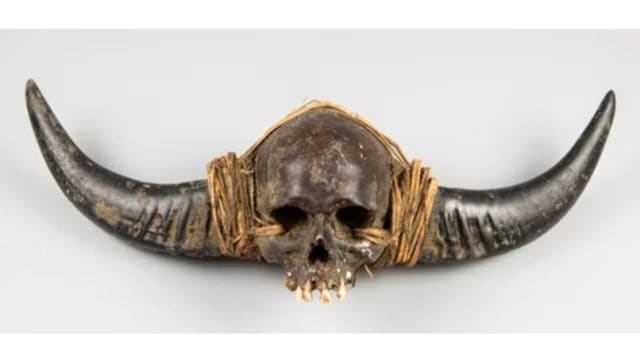Stay updated with the latest - Click here to follow us on Instagram
Indian tribes push to repatriate ancestral skulls from UK
This conversation came into focus recently when a 19th-century horned skull of a Naga tribesman was listed for auction in the UK.
 Experts estimate that UK museums and private collections hold around 50,000 Naga items. (Photo: easyliveAuction.com/Swan Fine Art)
Experts estimate that UK museums and private collections hold around 50,000 Naga items. (Photo: easyliveAuction.com/Swan Fine Art)Indian tribes from Nagaland are working to bring back ancestral skulls currently held in UK collections, sparking conversations about colonial legacies and the importance of cultural restitution. This issue came into focus recently when a 19th-century horned skull of a Naga tribesman was listed for auction in the UK.
The sale, advertised as part of a “Curious Collector Sale,” drew widespread outrage among the Naga people.
Ellen Konyak, a member of the Naga Forum for Reconciliation (NFR), expressed her shock and distress over the auction. “It was very insensitive and deeply hurtful,” she said.
The skull, valued between £3,500 and £4,000, was eventually withdrawn from the auction after protests from Naga scholars and officials. However, the incident revived painful memories of colonial violence and prompted fresh calls for the return of ancestral remains stored in foreign museums and private collections.
Experts estimate that UK museums and private collections hold around 50,000 Naga items, including 41 human remains at Oxford University’s Pitt Rivers Museum. Many of these remains were taken without consent during colonial times.
In recent years, museums have faced growing ethical concerns over displaying and possessing such items, leading to calls for their repatriation.
Returning human remains is a lengthy process. It involves researching their origins, identifying descendants, and navigating legal complexities. The NFR has formed a group called Recover, Restore, and Decolonise to lead these efforts. This work is deeply personal for the Naga people. For them, it is not just about logistics but also a spiritual journey to honour their ancestors and reclaim their heritage.
The NFR has been working to spread awareness by meeting with elders, organising lectures, and distributing educational materials. They are also addressing cultural challenges, such as deciding on the last rites for the returned remains, since most Nagas now follow Christianity, unlike their animist ancestors.
For Konyak and others, this effort is about respecting their elders and reclaiming their history. “We want them back as a mark of respect,” she said, “to claim our narrative.”
(With inputs from BBC)





- 01
- 02
- 03
- 04
- 05

























